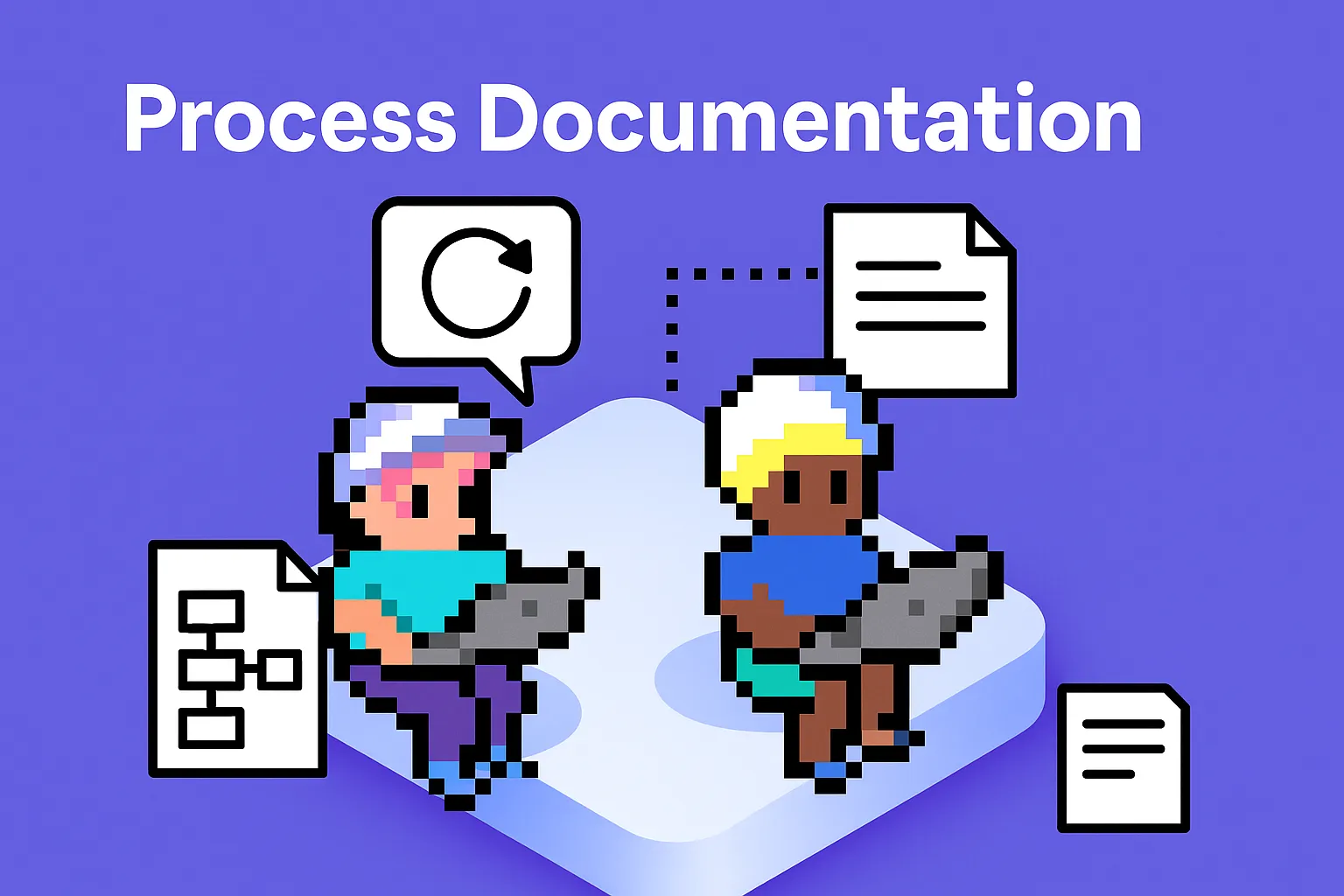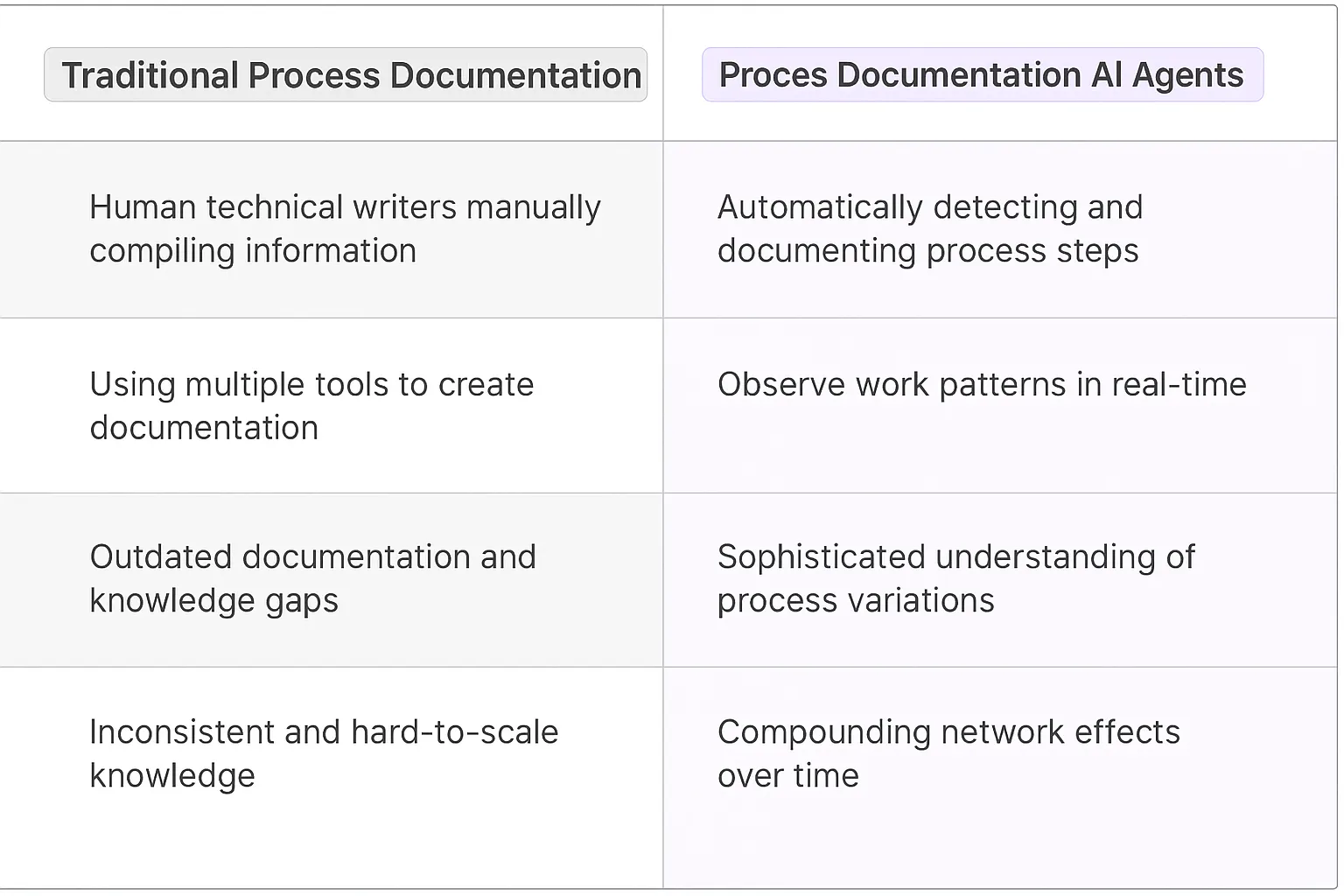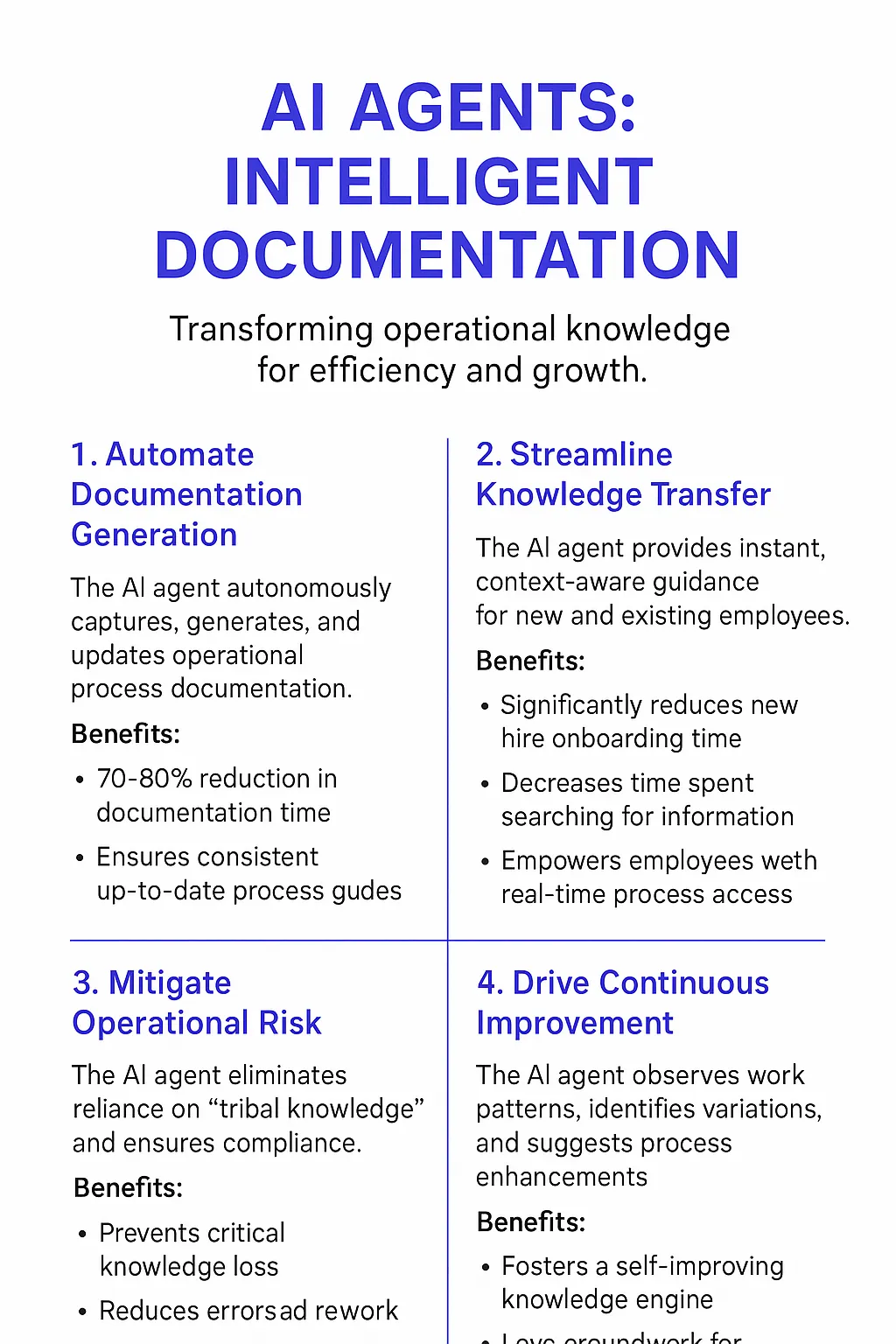Process Documentation Specialist is an AI-powered system that transforms how organizations capture, maintain, and distribute their operational knowledge. Unlike traditional documentation tools, it actively observes work patterns, identifies process variations, and automatically generates comprehensive documentation that reflects real-world practices. The system learns from every interaction, building an increasingly sophisticated understanding of your organization's unique workflows and tribal knowledge.

Traditional process documentation relied heavily on human technical writers spending countless hours shadowing employees, conducting interviews, and manually compiling information. Teams often used a mix of screen recording software, note-taking apps, and basic word processors to piece together documentation. The result? Outdated docs, knowledge gaps, and frustrated teams trying to maintain consistency across hundreds of processes.
Process documentation AI agents fundamentally shift how teams capture and maintain their operational knowledge. These digital teammates observe work patterns in real-time, automatically detecting and documenting process steps with remarkable accuracy.
The network effects here are fascinating - as more team members interact with the documentation agent, it builds an increasingly sophisticated understanding of process variations and edge cases. This creates a compounding knowledge advantage that's hard to replicate.
Key benefits include:
The most compelling aspect is how these agents learn organization-specific context over time. They begin to understand your company's unique terminology, workflows, and tribal knowledge - creating documentation that feels native to your culture rather than generic templates.

Process documentation has traditionally been a massive pain point for growing companies. The reality is that most teams document processes reactively - usually after something goes wrong or a key employee leaves. This creates huge operational risks.
What makes Process Documentation AI agents particularly powerful is their ability to create network effects within organizations. As these digital teammates document more processes, they build an increasingly valuable knowledge graph of how work actually gets done. This compounds over time - each new documented process makes the entire system more valuable.
The most interesting aspect is how these AI agents can identify patterns and connections between different processes that humans might miss. They can surface opportunities to standardize similar workflows across teams or highlight downstream dependencies that need to be considered when making changes.
For fast-growing companies, having this kind of institutional knowledge captured and maintained by AI agents creates a real competitive advantage. It allows them to scale operations and onboard new employees much more efficiently while maintaining consistency and quality.

Process documentation AI agents are fundamentally changing how organizations capture, maintain, and distribute their operational knowledge. The real power lies in their ability to adapt to different contexts while maintaining consistency and accuracy. Let me break down why this matters across industries.
When I advise startups and enterprise companies, I consistently see teams struggling with the same documentation challenges - tribal knowledge locked in people's heads, outdated SOPs, and inconsistent documentation practices. AI agents specifically designed for process documentation solve these core problems through their ability to learn, adapt, and scale documentation efforts.
The versatility of AI agents in process documentation makes them valuable across various industries. They're particularly effective at identifying gaps in existing documentation, suggesting improvements, and maintaining living documents that evolve with your organization. What's fascinating is how these digital teammates can understand context and nuance, making them invaluable for both technical and non-technical documentation needs.
Most importantly, these AI agents aren't just passive note-takers - they're active participants in knowledge management, capable of asking clarifying questions, spotting inconsistencies, and ensuring documentation aligns with industry best practices. This proactive approach to documentation represents a fundamental shift in how organizations manage their intellectual capital.
Manufacturing facilities face a critical challenge that's rarely discussed openly: the loss of decades of process knowledge when experienced workers retire. I've seen this firsthand while advising manufacturing startups - when a 30-year veteran leaves, they take with them countless micro-optimizations and troubleshooting techniques that kept production lines humming.
Process Documentation Specialist AI agents are transforming how manufacturers preserve and transfer this vital institutional knowledge. At a automotive parts manufacturer in Michigan, they deployed an AI agent that shadows senior technicians, recording and analyzing their daily workflows, maintenance procedures, and problem-solving approaches.
The AI agent doesn't just create static documentation - it builds an interactive knowledge base that captures the nuanced decision-making process. When a machine operator encounters an unusual vibration pattern, the AI can pull up relevant historical cases, complete with annotated photos, sensor data, and step-by-step resolution paths taken by experienced technicians.
What's particularly fascinating is how the AI agent adapts its documentation approach based on the audience. For new hires, it generates detailed walkthroughs with basic explanations of terminology. For experienced staff, it focuses on edge cases and advanced troubleshooting scenarios. This dynamic knowledge capture and distribution system has reduced training time by 64% and decreased production line downtime by 23%.
The real magic happens when you combine this with computer vision. The AI agent can watch a skilled worker perform a complex assembly task, automatically break it down into discrete steps, and generate visual documentation that highlights critical details newer workers might miss - like the specific angle to hold a welding torch or the sound that indicates proper bearing installation.
This shift from tribal knowledge to systematized, AI-enhanced documentation represents a fundamental evolution in how manufacturing expertise gets preserved and transmitted across generations of workers. It's not just about recording procedures - it's about capturing the deep understanding that comes from years of hands-on experience.
I've spent time with dozens of healthcare organizations, and there's a pattern I keep seeing: critical procedural knowledge gets lost in the daily chaos of patient care. The best nurses and clinicians develop incredibly nuanced approaches to everything from IV placement to wound care, but these insights typically live only in their heads.
A major hospital network in Boston implemented a Process Documentation Specialist AI agent that's fundamentally changing this dynamic. The AI shadows experienced nurses during their shifts, using natural language processing to capture their verbal explanations and computer vision to record precise hand movements and techniques.
What makes this particularly powerful is the AI's ability to identify and document subtle but crucial details that often get overlooked in traditional protocols. For example, when documenting central line placement procedures, the AI noticed that the most successful nurses used a specific wrist rotation technique that wasn't in any official manual - but significantly improved first-attempt success rates.
The AI agent creates layered documentation that adapts to different experience levels. For nursing students, it provides detailed anatomical context and step-by-step guidance. For experienced practitioners, it focuses on advanced techniques and rare complications. The system has reduced procedural errors by 42% and cut new staff onboarding time by half.
One fascinating aspect is how the AI handles emergency protocols. It continuously analyzes successful crisis responses, identifying patterns in team coordination and decision-making that lead to better outcomes. These insights get incorporated into dynamic playbooks that help teams respond more effectively to high-stress situations.
The most compelling metric isn't about efficiency - it's about knowledge preservation. When a veteran nurse with 25 years of experience retired last month, their expertise wasn't lost. Instead, it lives on in an AI-powered knowledge base that continues to evolve and adapt as new best practices emerge. This represents a fundamental shift in how healthcare organizations maintain and improve their standards of care.
Process documentation AI agents face several complex technical hurdles that teams need to navigate carefully. The first major challenge lies in accurately capturing process variations - while humans naturally adapt their documentation style based on context, AI agents need extensive training to recognize and document these nuances. They must parse both structured and unstructured data sources, from email threads to video calls, which requires sophisticated natural language processing capabilities.
Integration with existing knowledge management systems poses another significant technical barrier. Many organizations use a mix of legacy systems and modern tools, requiring the AI agent to seamlessly work across multiple platforms while maintaining data consistency. The agent needs to handle different file formats, metadata structures, and access permissions without breaking existing workflows.
Getting teams to trust and adopt process documentation AI agents requires careful change management. Employees often view documentation as a burden, and introducing an AI agent can initially feel like adding complexity rather than reducing it. Organizations need to invest time in training teams on how to effectively collaborate with these digital teammates, including understanding their capabilities and limitations.
Quality control becomes more nuanced with AI-generated documentation. While the agent can produce consistent documentation at scale, establishing review mechanisms to catch edge cases or incorrect interpretations is crucial. Organizations need to develop clear governance frameworks for when human review is necessary and how to maintain documentation accuracy over time.
Process documentation often involves sensitive information about internal operations, customer data, and proprietary methods. Organizations must carefully configure AI agents to comply with data protection regulations and internal security policies. This includes implementing proper access controls, data retention policies, and audit trails for all documented processes.
The challenge extends to managing what information the AI agent can access and document. Teams need to establish clear boundaries about which processes can be automated through AI documentation and which require human oversight due to their sensitive nature.
The shift to AI-powered process documentation marks a fundamental evolution in how organizations preserve and transmit knowledge. These digital teammates don't just document processes - they create living knowledge systems that capture the deep expertise and subtle nuances that make operations truly effective. For organizations serious about scaling their operations while maintaining quality and consistency, Process Documentation Specialist AI agents offer a compelling path forward. The network effects and compound learning these systems enable create lasting competitive advantages that grow stronger over time.